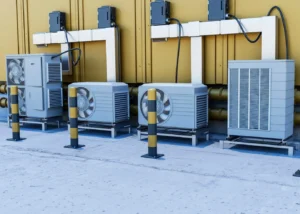
By Admin
Extreme temperatures can strain your cooling system. Learn how to prepare AC for extreme weather with these essential tips to ensure efficiency and longevity. If your unit is already struggling, timely air condition repairing can prevent further damage and keep it running smoothly.
Air conditioning systems are built to keep us comfortable, but when extreme weather hits—whether it’s scorching heat or unexpected storms—your AC might struggle to perform efficiently. Without proper preparation, it can suffer from wear and tear, energy inefficiency, or even breakdowns when you need it the most.
To avoid costly repairs and discomfort, it’s crucial to take preventive measures and prepare AC for extreme weather in advance. In this guide, we’ll walk you through practical steps to ensure your unit remains in top condition, providing reliable cooling all year round.

Your air conditioner works by regulating indoor temperatures and managing humidity levels. However, extreme weather conditions can significantly impact its performance. Here’s how:
By taking preventive action, you can reduce the risk of system failure and ensure uninterrupted cooling. Let’s explore the best ways to prepare AC for extreme weather effectively.
Dirty air filters restrict airflow, making your AC work harder and increasing energy consumption. Before extreme weather sets in, check and clean or replace the filters to improve efficiency and air quality.
Your AC’s outdoor condenser unit is exposed to dust, debris, and weather changes. Keep it clean by:
Low refrigerant levels can cause your AC to struggle, especially during extreme heat. If you notice reduced cooling performance, strange noises, or ice buildup on the coils, it may be time for a professional refrigerant check.
If heavy rains, strong winds, or storms are expected, take precautions to prepare AC for extreme weather:
Leaky or poorly insulated ducts can lead to energy loss, making your AC work harder to maintain the desired temperature. Sealing and insulating ducts will enhance cooling efficiency, especially during extreme heat waves.
A well-functioning thermostat is crucial to prepare AC for extreme weather. Before extreme temperatures hit:
Regular AC servicing ensures all components are in top condition before extreme weather arrives. A professional technician from a renowned AC repair services can help by:
Extreme weather, particularly storms and heat waves, can cause power fluctuations that may damage your AC unit. Installing a surge protector can safeguard electrical components from sudden voltage spikes.
Poor ventilation can trap heat inside, making your AC work harder. To improve airflow:
In case of sudden AC failure during extreme heat, have a backup plan:

Yes, extreme heat can overwork your AC, leading to higher energy bills, component wear, and potential breakdowns. Regular maintenance and setting a reasonable temperature can help prevent strain.
It’s recommended to turn off your AC during severe storms to prevent electrical damage from power surges. Installing a surge protector can offer additional safety.
During high heat or dust storms, it’s best to check your filter every month and replace it if necessary. Clean filters improve efficiency and air quality.
Yes, using a breathable AC cover can protect your unit from debris and heavy rainfall, but ensure it allows proper ventilation to prevent moisture buildup.
If you notice weak airflow, unusual noises, high energy bills, or poor cooling, it’s time to call a professional from the Best AC repair services for an inspection.
Extreme weather conditions can take a toll on your air conditioning system, but with the right precautions, you can prepare AC for extreme weather and keep it running smoothly throughout the year. From cleaning air filters to securing the outdoor unit, small preventive steps can make a big difference in your AC’s performance and lifespan.
If you need expert assistance, professional technicians from a renowned AC repair service can ensure your system is in top shape, providing reliable cooling even in harsh weather. Don’t wait until your AC fails—stay prepared and protect your comfort today!